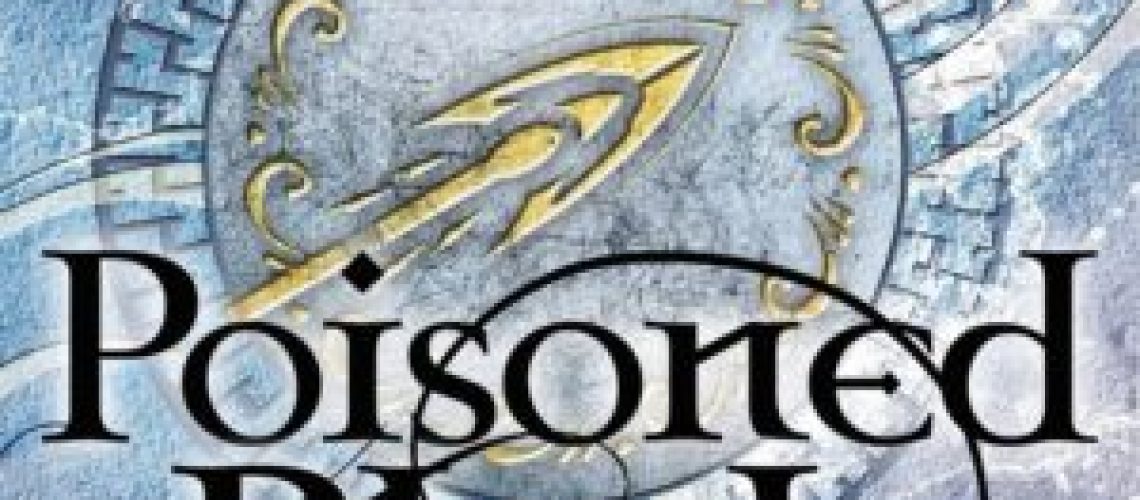Second in the Court of Fives series, following Court of Fives, Poisoned Blade by Kate Elliott continues the epic YA fantasy story of Jessamy, as she struggles to preserve herself and her family. Her expertise and skill at the Fives has put her into the intrigue and machinations of Garon Palace, as factions within the court struggle to influence, if not outright control, the throne. But what can the daughter of a General, struggling to keep herself and her family above water, do against that? She has a game to master, and in the mastery of that game, and protecting her family, young Jessamy is going to be catapulted out of the capital, and into the countryside. There, away from all she has known, treachery, betrayal, loyalty and the struggle for the future of her country irrevocably change her own quest.

Poisoned Blade masterfully brings its heroine to life. Jessamy is loyal and rebellious. Calculating and impetuous. Curious and cautious. A young woman who, even after the events of the first novel, is walking on a dangerously narrow beam, with opponents and rivals all about her. And her allies? Can she trust them? Can she trust herself with them? The novel shines when it focuses on her personal story. The lens of the novel stays on her, and we get to see Jessamy’s story unfold as she struggles and succeeds for ever larger stakes. Her rise to the obstacle-course-like sport of The Fives in the first novel pales in comparison by what is expected of her in this novel. I felt strongly for Jessamy and her story. Between her athletics and her personality, I can see Jessamy as a role model for teeanged readers of all stripes, a character to look up to, especially her unrelenting tenacity.
This is not to say that there aren’t rewards beyond character-focus in the novel. The action sequences in the Fives competitions are well done and once again show that, yes, women can compete, and succeed in sports. While comparisons to The Hunger Games are relatively easy to make, I think that the secondary worldbuilding and the exotic culture help make Jessamy stand out as a character in her world. Sure, she uses weapons and is as athletic as Katniss, but she stands distinct and individual. I also think that the novel does provide a path for readers who loved The Hunger Games to branch from dystopian fiction to the wonders of secondary world fantasy.
Kate Elliott’s growing expertise in YA fantasy (YA epic fantasy) continues apace in this volume. Is Poisoned Blade that extremely complex 800-page epic fantasy worldbuilding that I read her other novels for? Absolutely not. There is an almost ruthless focus on Jessamy as a single POV character, on her situation, on her part of the world. Sure, I really want to know more about the world, and in some sense want to read that classic Epic Fantasy set in Saryenia. I want to explore every inch of the gorgeous map at the front of this book, and then some. It’s a world that’s inspired by Ptolemaic era Egypt in the struggles of the Eastern Mediterranean with the other Alexandrian successor kingdoms, complete with a touch of magic. Oh, and spider-golem automation warmachines. We get to see those in action in this book and it’s glorious. But I want to really get a full and complete sense of what this world is all about. I am convinced that while it’s not physically on the page, that at least in the author’s head, the full-scale epic fantasy world is there.
It seems that writing YA in a secondary world, at least the reading experience of someone like Kate Elliott doing it, as compared to an epic fantasy, is like careful use of focus and aperture in a camera. In that epic fantasy, the aperture is small, the hyperfocal distance calculated, the entire gigantic scene is in crystal clarity, from the characters in the foreground, to the scenery in the distance. It’s a beautiful and rich world where you can get lost in the details, forever, if the author handles her material well (and Elliott SO does). A YA, even in the hands of an author like Elliott, is instead, a blown-up wide aperture, a focus on a nearby subject. Imagine that big scene again, but instead the lens of the camera is focused on the teenaged girl in the foreground. You can see all of her, the focus is on her, the center of the picture and the world is her. That beautiful scenery and stuff is somewhat blurred, out of focus, not the point. It is there in that diffuse form to accentuate and keep the attention on the heroine. It is there in that diffuse form so as to keep the focus on her story, her struggle, her adventure, her agency. That’s what Kate Elliott did in Court of Fives and now Poisoned Blade. And that’s why you should read it.







